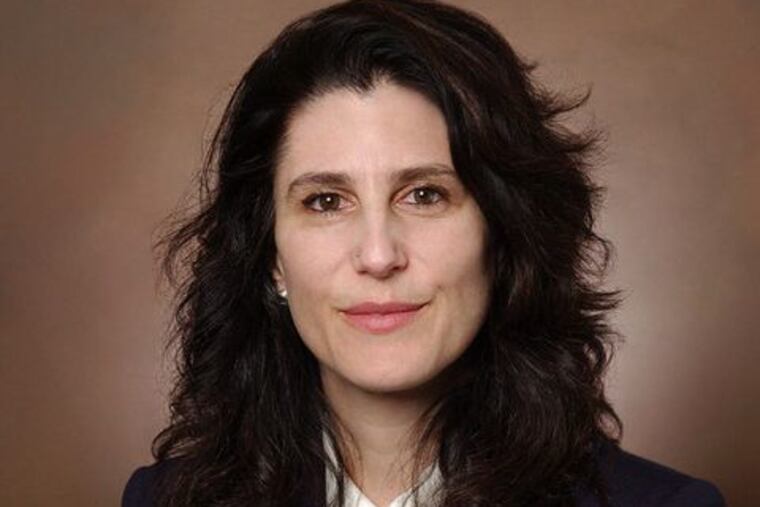A Philadelphia physician podcaster takes on equity in medicine in the COVID-19 era
Podcasts offer a uniquely influential vehicle for perspectives, voices, styles, and stories. Yet the field is dominated by men. This is particularly true for medical podcasts.

I was always reluctant to share personal stories at work, never mind when lecturing at a medical conference. I felt more comfortable focusing on the patient or on the data.
But a little over five years ago, preparing for a TEDMED talk, I had the opportunity to work with a professional storyteller. And the experience was transformative.
For a presentation on leadership, I shared the story of a job interview after completing emergency medicine training. The chairperson told me there were three reasons he did not wish to hire me. Number one: I was a newly graduated doctor and he sought people with experience. Number two: He had never hired a doctor from my residency program. And the stand out? He had bad luck hiring women: They tended to get pregnant.
Yet he hired me.
The response I got to sharing that experience amazed me. People connected with me. They appreciated my candor and openness, my humanness, and my personality.
I started seeking out spoken word story events such as the Moth. I also started listening to podcasts. Sure, storytelling is therapeutic for the audience. But something more became apparent for me: Storytelling helps the storyteller in a cathartic and making-sense-of-the-world sort of way.
On a memorable episode of the podcast Lessons Hard Learned, I shared a patient encounter that had stuck with me. A man came to the emergency department after tripping on the sidewalk and needing a bleeding cut sewn. Lying on the hospital bed, a paper cloth shielding his face, he shared a distressing story for what seemed to be the first time ever. He had been a physician who left his medical practice many years earlier over a patient error, and never acknowledged it, either to the patient’s family or to his hospital quality team. I listened silently. Slowly and deliberately placing stitch by stitch, I received his confession.
As Ursula K. Le Guin wrote: “Storytelling is a tool for knowing who we are and what we want, too. If we never find our experience described in poetry or stories, we assume that our experience is insignificant.”
Podcasts offer a uniquely influential vehicle for perspectives, voices, styles, and stories. Yet the field is dominated by men. This is particularly true for medical podcasts. This gnawed at me as motivation. Why don’t we hear more women as hosts. Why don’t we see people of color speaking as subject matter experts on varied topics?
I knew I wanted to create my own podcast, and peppered friends with countless questions about hardware, software, editing, music, publishing, website building. As a maiden voyage, I created a few series for the FemInEM podcast. My intention was steadfast: amplify voices and focus attention on people who may not be recognized for the impact they have in their field.
I hosted and curated a series on women physicians, who started in emergency medicine, and then left for other careers. For the 2018 African Conference on Emergency Medicine in Kigali, Rwanda, I interviewed and curated a series on women physicians who were leading the establishment of emergency medicine as a recognized specialty across the continent.
I launched my Visible Voices podcast during the initial phase of the COVID-19 pandemic. In March, as much of the world sheltered something urged me to launch. Launch now. Launch while the website may not be perfect or polished or pretty. Launch so you can share how the medical community is responding, how emergency departments are preparing, how PPE really is limited, how inspiring leaders are leading. Launch now to discuss structural racism, and how the virus is disproportionately affecting certain communities. Launch to use your voice and other voices to share the stories that are affecting us.
I recorded the first episode onMarch 16, the day Philadelphia Mayor Jim Kenney ordered all nonessential businesses and government operations to close. The city had nine documented patients infected with the COVID-19 virus. I spoke with physician friends in Geneva, London, and Philadelphia to capture the work, the environment, and the feelings of each friend in each city. Eva was exhausted. She had already diagnosed the first confirmed COVID-19 infection in Geneva. Segun had a calm anxiousness in his voice as London waited and he prepared his cardiac care unit. And Jamie felt the weight I felt. We were preparing ourselves for the wave traveling south from New York that was about to crash on Philadelphia’s shores.
My guests speak on topics covering health care, equity, and current trends. I want to amplify voices of people both known and unknown with the goal of challenging the audience to think, to trigger interesting conversations, and to broaden perspectives. I created and host a podcast because I want to weather this time period and help people look for a better tomorrow.
Resa E. Lewiss is an emergency physician at Thomas Jefferson University, and host and creator of the Visible Voices podcast, at www.thevisiblevoicespodcast.com, or subscribe through Apple, Google, Spotify, and Stitcher. Her first episode after the election is an interview with Gloria Steinem. She will speak on Friday, Nov. 13 at the Inquirer’s “Telling Your Health Story” event.